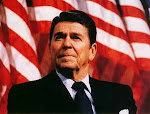So Barack Obama doesn't know how many states are in the United States. Well. Ordinarily I might be willing to cut him a little slack and say that he was tired and misspoke but the Democrats have made very clear that when a Republican says something stupid there can be no explanation except that he is a fool. They've made an entire industry out of cutting no slack for these guys, publishing books of malapropisms and factual gaffes, web site filled with mockery, etc. So I'm sure they would have it no other way than to have their guys judged by the same standards. So, let me say here and now that Barack Obama is a maroon, an ignoramus and a twit. And when thinking of such things I am, of course immediately reminded of the original village idiot, Dan Quayle. Well, I've never thought of Quayle this way (I've always liked and admired Quayle) but the Dems and the media have been working overtime to portray him that way for more than a decade.
This Obama/Quayle confluence got me thinking: how exactly do these two guys stack up against each other? As we've already established using Democrat rules, they're both twits, so the best way to judge them would have to be by seeing how much and what quality experience each has. Hmmm. Let's see, here's a quick look at Quayle:
QUAYLE, James Danforth (Dan), a Representative and a Senator from Indiana and a Vice President of the United States; born in Indianapolis, Marion County, Ind., February 4, 1947; attended the public schools of Phoenix, Ariz., and Huntington, Ind.; graduated, DePauw University, Greencastle, Ind., 1969; graduated, Indiana University, Indianapolis 1974; admitted to the Indiana bar in 1974 and commenced practice in Huntington; served in the Indiana National Guard 1969-1975; associate publisher of the Huntington Herald Press; elected as a Republican to the Ninety-fifth Congress in 1976; reelected to the Ninety-sixth Congress (January 3, 1977-January 3, 1981); was not a candidate in 1980 for reelection to the House of Representatives, but was elected to the United States Senate; reelected in 1986 and served from January 3, 1981, until January 3, 1989, when he resigned to become Vice President of the United States; chairman, Select Committee to Study the Committee System (Ninety-eighth Congress); elected Vice President of the United States in 1988 with President George Herbert Walker Bush and was inaugurated January 20, 1989; unsuccessful candidate for reelection as Vice President in 1992; is a resident of Paradise Valley, Ariz.
Wow. Kind of impressive. But certainly the Obamessiah has a resume that will put Quayle to shame. Let's look here:
OBAMA, Barack, a Senator from Illinois; born in Honolulu, Hawaii, August 4, 1961; obtained early education in Jakarta, Indonesia, and Hawaii; continued education at Occidental College, Los Angeles, Calif.; received a B.A. in 1983 from Columbia University, New York City; worked as a community organizer in Chicago, Ill.; studied law at Harvard University, where he became the first African American president of the Harvard Law Review, and received J.D. in 1991; lecturer on constitutional law, University of Chicago; member, Illinois State senate 1997-2004; elected as a Democrat to the U.S. Senate in 2004 for term beginning January 3, 2005.
Huh? Wait a second. How is this possible? Dan Quayle had sixteen years of national-level political experience before he made his aborted run for the Presidency (which was generally mocked)? And Obama has three? Well, obviously Quayle's many years must be empty, petty, partisan years while Obama's shorter time must be filled with accomplishments and "bringing people together. Let's see; first Quayle:
His assignments on the Labor and Human Resources Committee (and its subcommittee, Employment and Productivity, which he has chaired) and on the Senate Armed Services Committee give him perspective on both domestic and foreign policy. Quayle wrote several defense-procurement-reform measures, one of which recommended a Pentagon czar to oversee defense purchasing, a measure later supported by President Reagan's blue-ribbon procurement-reform panelthe Packard commission-and now a reality. Interestingly, Quayle frequently allied himself with Carl Levin, the liberal Democratic senator from Michigan, in trying to eliminate waste and fraud at the Pentagon.
Along with Ted Kennedy, Quayle co-sponsored the 1982 Job Training and Partnership Act (JTPA), which passed not only the Senate but also the House, and which is now law. JTPA replaced the failed make-work Comprehensive Employment and Training Act (CETA) program in providing work skills to the hard-to-employ.
Quayle was JTPA's prime mover. As he had with Levin, Quayle worked with Kennedy to develop the measure, introduce it, and manage the entire process in collaboration with Reagan's Department of Labor. "He brought them all along-Metzenbaum, Simon, Hatch, Humphrey," says a Hill insider. "Quayle's the only one on that committee who could reach across lines. Hatch has a hard time doing it-I mean, playing honest broker. Likewise Humphrey." Of Quayle's politics, this source adds: "Despite his press image, he's rational, and fairly moderate. No one who's seen Dan Quayle in action classifies him as a hard-core conservative ideologue." In 1982, Quayle was the first senator to introduce a comprehensive tax-reform plan, beating to the punch New Jersey Senator Bill Bradley. On environmental issues like soil conservation, the Clean Water Act (he voted to override Reagan's veto), and expansion of wilderness lands, Quayle has been in the vanguard.
In the child-care debate, Representative Tom Tauke (R., Iowa) crafted a consensus conservative alternative to the bill of Senator Chris Dodd (D., Conn.), trying to head off Dodd's massive federal day-care bureaucracy. By no means a pioneer in child care himself, Quayle had the good sense to sponsor the Tauke measure in the Senate. On the basis of this bill, plus the Labor Department's valuable taskforce study (commissioned by the able and prescient Secretary of Labor, Ann McLaughlin), George Bush fashioned a compromise proposal to meet the child-care needs of families where the mothers stay at home, as well as those of families where the mothers work.
Another legislative activity that gives insight into Quayle is his work as ranking Republican on the Labor subcommittee dealing with pensions-that dry-as-dust, extremely complex workforce subject that is both critically important and intolerably boring. Quayle, for example, introduced the Pension Portability Law. "It's not an issue for lightweights," says a ranking Labor Department bureaucrat (not the Secretary). "Quayle is seen as articulate, hard-working, and capable of dealing with very complicated legislative fine print." This month's Pension and Investment Age credits Quayle with an active role in the pension arena, notably in the production of the important 1987 Pension Protection Act.
WHAT HIS 12 years on Capitol Hill tell us about Quayle is that, perhaps more than anything else, he is a deal-cutter. Skilled and pragmatic, Quayle is not unlike Dole in this respect, though he is not quite as smart as Dole. Quayle's father is right when he says, "Dan's quite a salesman." In the Hill context, "negotiator" might be a better word, or "consensus-builder"-which, come to think of it, would put him beyond Dole.
What? Quayle wasn't a "lightweight" and actually worked with Dems to build a consensus? How can this be?
Well if the man most mocked by Dems has this much going for him Obama must just blow Quayle's quality of accomplishment out of the water. Let's take a look:
Hillary Clinton has been trying to make a point about Barack Obama that deserves one last careful look before Tuesday's probably decisive Democratic primaries: If Obama truly intends to unite America across party lines and break the Washington logjam, then why has he shown so little interest or aptitude for the hard work of bipartisan government?
This is the real "where's the beef?" question about Obama, and it still doesn't have a good answer. He gives a great speech, and he promises that he can heal the terrible partisan divisions that have enfeebled American politics over the past decade. And this is a message of hope that the country clearly wants to hear.
But can he do it? The record is mixed, but it's fair to say that Obama has not shown much willingness to take risks or make enemies to try to restore a working center in Washington. Clinton, for all her reputation as a divisive figure, has a much stronger record of bipartisan achievement. And the likely Republican nominee, John McCain, has a better record still.
Obama's argument is that he can mobilize a new coalition that will embrace his proclamation that "yes, we can" break out of the straitjacket. But for voters to feel confident that he can achieve this transformation should he become president, they would need evidence that he has fought and won similar battles in the past. The record here, to put it mildly, is thin.
What I hear from politicians who have worked with Obama, both in Illinois state politics and here in Washington, gives me pause. They describe someone with an extraordinary ability to work across racial lines, but not someone who has earned any profiles in courage for standing up to special interests or divisive party activists. Indeed, the trait people remember best about Obama, in addition to his intellect, is his ambition.
Obama worked on some bipartisan issues, such as a state version of the earned-income tax credit, after he was elected to the Illinois Senate in 1996. But he also gained a reputation for skipping tough votes. The most famous example was a key gun-control vote that he missed in December 1999 because he was vacationing in Hawaii. The Chicago Tribune blasted him and several other vote-skippers as "gutless." One Chicago pol says that "the myth developed that when there was a tough vote, he was gone."
Obama's brash self-confidence led him into his only big political blunder. Prodded by the Daley machine, he challenged Bobby Rush, an incumbent Democratic congressman and former Black Panther, in 2000. Rush pounded Obama by more than 2-1in the primary. "He was blinded by his ambition," Rush told The New York Times last year.
Obama has been running for president almost since he arrived in the U.S. Senate in 2005, so his Senate colleagues say it's hard to evaluate his record. But what stands out in his brief Senate career is his liberal voting record, not a history of fighting across party lines to get legislation passed. He wasn't part of the 2005 "Gang of 14" bipartisan coalition that sought to break the logjam on judicial nominations, but neither were Clinton or other prominent Democrats. He did support the bipartisan effort to get an immigration bill last year, winning a plaudit from McCain. But he didn't work closely with the White House, as did Sen. Edward Kennedy.
What? Obama is a village idiot whose record doesn't stand out for its brilliance,
But what stands out in his brief Senate career is his liberal voting record, not a history of fighting across party lines to get legislation passed.
? How can this be? By looking at the record it is obvious that Dan Quayle (Dan Quayle??) was and is a more accomplished legislator and was more likely to have made a better President than Barack Obama ever will.
Wow. Wait till the media finds out. Boy, I bet they'll really tear Obama apart. Right?







No comments:
Post a Comment